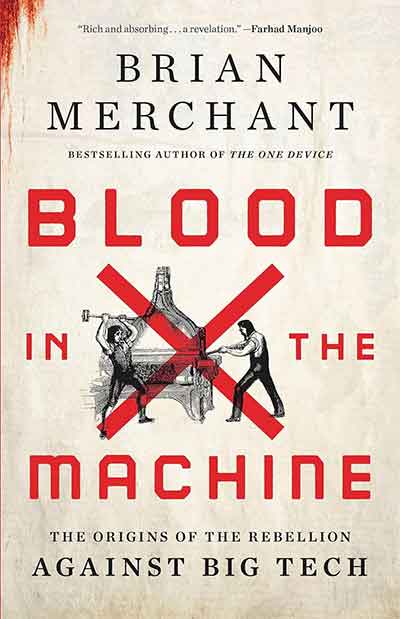A Review of “Blood in the Machine” by Brian Merchant
George Santayana’s statement that “those who cannot remember the past are condemned to repeat it” is quoted most-often as an admonition. While it was certainly meant to be just that, it is rather more useful to think of it, instead, as a playbook. After all, if one likes the results of the past, then why not repeat the past? And if the past offers guidelines on how to dominate the present or the future, then repeat it we shall!
Brian Merchant’s magisterial study of the Luddites, “Blood in the Machine: The Origins of the Rebellion Against Big Tech,” shows the remarkable similarities between the Tech Titans of the early 1800s in England and those who stride like Colossi over the economy (and increasingly social life and politics) today. With both analytical precision and poetic narrativity, Merchant rubbishes the idea of the Luddites as mindless, anti-progress fools and shows, in detail, how they were thoughtful analysts of both the changing world and of the role of technology in destroying livelihoods when wielded by men of avarice.
The contemporary authorities in England crushed the Luddite rebellion with brutality; now, Big Tech crushes dissenters with calumny, lambasting them for their antediluvian views and ridiculing them for being hopelessly mired in the past while pushing them to the edge of the economy. Just as Big Tech swarms over us all like a sea of locusts, it rejects all that it cannot assimilate and pushes them to the periphery of society.
It is as if the Masters of the Tech Universe simply adjusted and modernized the playbook, while amassing untold wealth and breeding inequality. Now, with AI looming as the next frontier, the rhetoric emanating from Big Tech is eerily like that of the Capitalist and Machine-Owning class of Mill Owners who reigned just over two centuries ago. Along the way, we had Marx but it appears that Winslow Taylor won the battle.
While the playbook discussed above is just a construct, there is a profound irony here. Since the more things change, the more they stay the same, historical examples and guidelines can loom large even when those wielding power are blissfully unaware of history. Those who call other “Luddites” as pejorative know nothing of the Luddite rebellion. Those who rule the roost today are driven by memes and not historiography.
With this book Merchant puts them on notice. Perhaps, he tells us, the modern version of “Enoch’s Hammer” will be wielded by concerned folks today and, certainly, that is a good thing.





